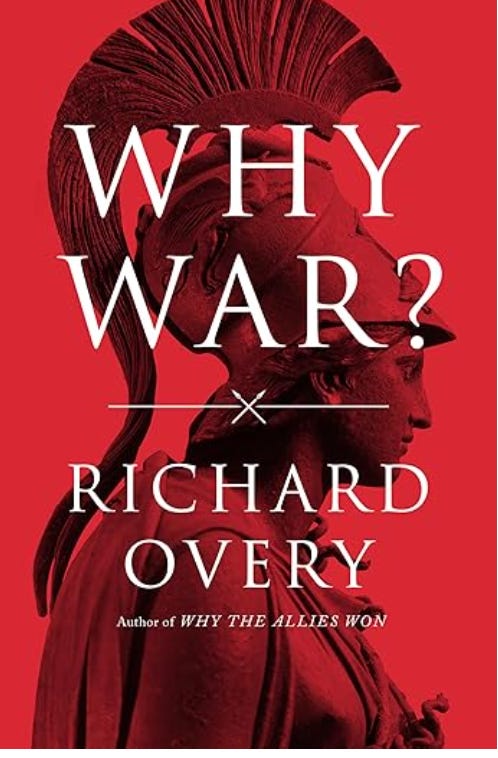I teach a course called “The American Way of War”—it began as an independent study with a student who’s now at the U.S. Naval Academy in Annapolis—that consists of three case studies: The American Revolution, the Civil War, and World War II. But I start the class with Margaret MacMillan’s impressive 2020 book War: How Conflict Shaped Us, an anthropologically-inflected study that systematically breaks the experience of war into a series of components such as motives, methods, the experience of combat, the role of civilians, and so on. It’s a great springboard for the particulars that follow.
Last month, the Academic Dean at my school alerted me to Richard Overy’s new book Why War? Like MacMillan, Overy takes a transhistorical perspective toward warfare, but zeroes in on the reasons why people wage deadly encounters. And like her, he breaks the question down into a series of constituent parts. Overy, a World War II historian based in Italy, classifies his answers into two parts. The first looks at what might be termed the scientific (or, at any rate, deterministic) components of warfare: biology, psychology, anthropology, and ecology. In all these cases, these are factors that operate independently of individual choice or consciousness. In the second half of the book, Overy looks at what might be termed the more contingent (which is to say historically determined) factors that drive warfare: resources, belief, power, and security. He’s careful to note that none of these strands operates in isolation. But he dissects them effectively with well-chosen examples that range from prehistoric archeology to the current war between Russia and Ukraine.
Overy is also careful to note that none of these factors makes war inevitable. People with different ideologies, relative military strength, resource access, and perceived vulnerability live side by side all the time. And the very common human imperatives that can result in war can also result in cooperation. But if a given conflict is never inevitable, he makes a convincing case that war can never be willed away, whether by the application of expertise, a rational calculation, or a belief that humanity will evolve beyond it. War is with us to stay. Thinking intelligently about it may help mitigate the damage—or put it toward redemptive use.



